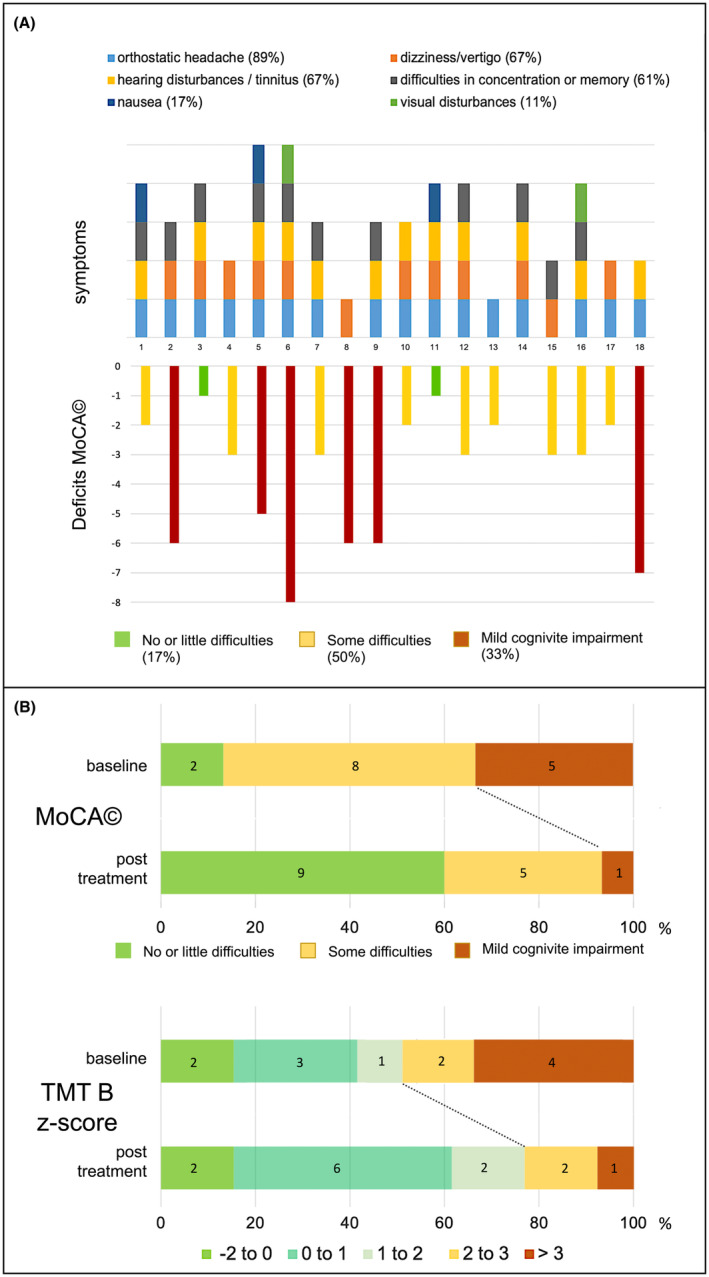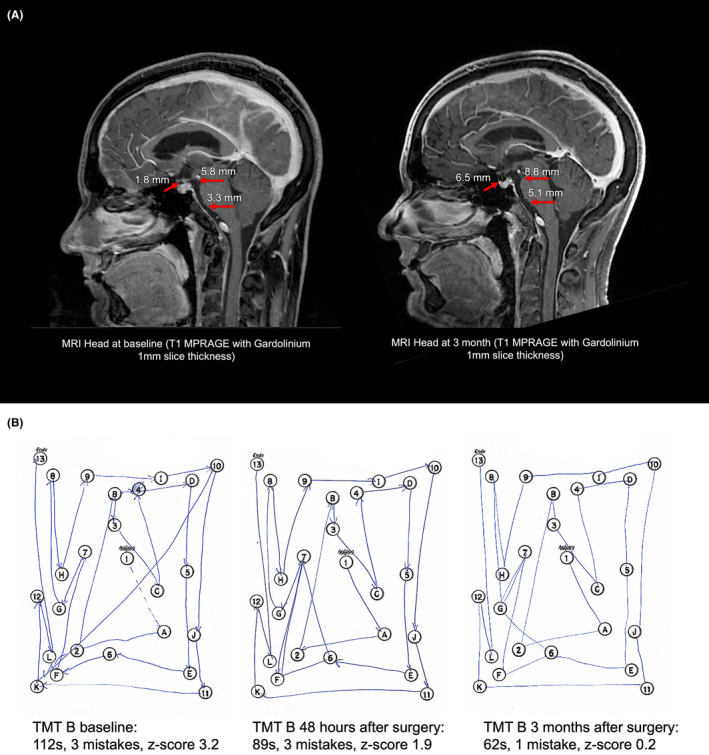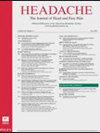Katharina Wolf, Florian Volz, Amir El Rahal, M Overstijns, Niklas Lützen, Charlotte Zander, Mukesch J Shah, Horst Urbach, Jürgen Beck
下载PDF
{"title":"自发性颅内低血压的轻度认知障碍及其通过脊髓脑脊液泄漏修复的快速逆转。","authors":"Katharina Wolf, Florian Volz, Amir El Rahal, M Overstijns, Niklas Lützen, Charlotte Zander, Mukesch J Shah, Horst Urbach, Jürgen Beck","doi":"10.1111/head.14882","DOIUrl":null,"url":null,"abstract":"<p><strong>Background: </strong>Patients with spontaneous intracranial hypotension (SIH) report difficulties in concentration and memory. To objectify these deficits, we implemented standard cognitive tests into our routine SIH workup.</p><p><strong>Method: </strong>Retrospective, single-center report of cognitive standard tests among patients with SIH consecutively admitted from May to July 2023. Cognitive testing involved the Montreal Cognitive Assessment (MoCA©, alternate versions, 0-30 points, 30 points for best performance, ≤26 indicating mild cognitive impairment at age >64 years), and the Trail Making Test, part B (TMT B, z-scores adjusted to age and education) to test for executive function. Both were administered at admission, and within 36-72 h after surgical repair of the spinal cerebrospinal fluid (CSF) leak.</p><p><strong>Results: </strong>A total of 18 patients with an active spinal CSF leak were tested at admission (seven with ventral, three with lateral leak, and eight with CSF-venous fistula). There was no profound brain sagging as described in brain sagging dementia. The mean (standard deviation [SD]) age was 53.6 (11) years. Bern scores ranged between 0 and 9, median 6.5. The mean (SD) MoCA score at admission was 26.5 (2) points, with five patients (28%) scoring <26 points indicative of mild cognitive impairment. Performance in the TMT B was impaired in nine patients (50%, z-score ≥2). Upon targeted treatment of the CSF leak, the mean (SD) MoCA score immediately improved to 28.5 (1), p = 0.001 (n = 14), as did performance on the TMT B (mean [SD] 2.1 [2] vs. 1.1 [1], p = 0.015, n = 13).</p><p><strong>Discussion: </strong>Spontaneous intracranial hypotension with an active spinal CSF leak is associated with cognitive impairment and surgical closure of the leak led to rapid improvement. We conclude that there may be a causal relationship between cognitive dysfunction and spinal CSF loss. We suggest considering spinal CSF leaks as a treatable cause in patients with mild cognitive impairment and with pre-dementia. This may ultimately necessitate thorough screening of brain and spine magnetic resonance images in patients with mild cognitive impairment.</p>","PeriodicalId":12844,"journal":{"name":"Headache","volume":" ","pages":"382-388"},"PeriodicalIF":4.0000,"publicationDate":"2025-02-01","publicationTypes":"Journal Article","fieldsOfStudy":null,"isOpenAccess":false,"openAccessPdf":"https://www.ncbi.nlm.nih.gov/pmc/articles/PMC11794966/pdf/","citationCount":"0","resultStr":"{\"title\":\"Mild cognitive impairment in spontaneous intracranial hypotension and its rapid reversal by repair of a spinal cerebrospinal fluid leak.\",\"authors\":\"Katharina Wolf, Florian Volz, Amir El Rahal, M Overstijns, Niklas Lützen, Charlotte Zander, Mukesch J Shah, Horst Urbach, Jürgen Beck\",\"doi\":\"10.1111/head.14882\",\"DOIUrl\":null,\"url\":null,\"abstract\":\"<p><strong>Background: </strong>Patients with spontaneous intracranial hypotension (SIH) report difficulties in concentration and memory. To objectify these deficits, we implemented standard cognitive tests into our routine SIH workup.</p><p><strong>Method: </strong>Retrospective, single-center report of cognitive standard tests among patients with SIH consecutively admitted from May to July 2023. Cognitive testing involved the Montreal Cognitive Assessment (MoCA©, alternate versions, 0-30 points, 30 points for best performance, ≤26 indicating mild cognitive impairment at age >64 years), and the Trail Making Test, part B (TMT B, z-scores adjusted to age and education) to test for executive function. Both were administered at admission, and within 36-72 h after surgical repair of the spinal cerebrospinal fluid (CSF) leak.</p><p><strong>Results: </strong>A total of 18 patients with an active spinal CSF leak were tested at admission (seven with ventral, three with lateral leak, and eight with CSF-venous fistula). There was no profound brain sagging as described in brain sagging dementia. The mean (standard deviation [SD]) age was 53.6 (11) years. Bern scores ranged between 0 and 9, median 6.5. The mean (SD) MoCA score at admission was 26.5 (2) points, with five patients (28%) scoring <26 points indicative of mild cognitive impairment. Performance in the TMT B was impaired in nine patients (50%, z-score ≥2). Upon targeted treatment of the CSF leak, the mean (SD) MoCA score immediately improved to 28.5 (1), p = 0.001 (n = 14), as did performance on the TMT B (mean [SD] 2.1 [2] vs. 1.1 [1], p = 0.015, n = 13).</p><p><strong>Discussion: </strong>Spontaneous intracranial hypotension with an active spinal CSF leak is associated with cognitive impairment and surgical closure of the leak led to rapid improvement. We conclude that there may be a causal relationship between cognitive dysfunction and spinal CSF loss. We suggest considering spinal CSF leaks as a treatable cause in patients with mild cognitive impairment and with pre-dementia. This may ultimately necessitate thorough screening of brain and spine magnetic resonance images in patients with mild cognitive impairment.</p>\",\"PeriodicalId\":12844,\"journal\":{\"name\":\"Headache\",\"volume\":\" \",\"pages\":\"382-388\"},\"PeriodicalIF\":4.0000,\"publicationDate\":\"2025-02-01\",\"publicationTypes\":\"Journal Article\",\"fieldsOfStudy\":null,\"isOpenAccess\":false,\"openAccessPdf\":\"https://www.ncbi.nlm.nih.gov/pmc/articles/PMC11794966/pdf/\",\"citationCount\":\"0\",\"resultStr\":null,\"platform\":\"Semanticscholar\",\"paperid\":null,\"PeriodicalName\":\"Headache\",\"FirstCategoryId\":\"3\",\"ListUrlMain\":\"https://doi.org/10.1111/head.14882\",\"RegionNum\":2,\"RegionCategory\":\"医学\",\"ArticlePicture\":[],\"TitleCN\":null,\"AbstractTextCN\":null,\"PMCID\":null,\"EPubDate\":\"2024/12/15 0:00:00\",\"PubModel\":\"Epub\",\"JCR\":\"Q1\",\"JCRName\":\"CLINICAL NEUROLOGY\",\"Score\":null,\"Total\":0}","platform":"Semanticscholar","paperid":null,"PeriodicalName":"Headache","FirstCategoryId":"3","ListUrlMain":"https://doi.org/10.1111/head.14882","RegionNum":2,"RegionCategory":"医学","ArticlePicture":[],"TitleCN":null,"AbstractTextCN":null,"PMCID":null,"EPubDate":"2024/12/15 0:00:00","PubModel":"Epub","JCR":"Q1","JCRName":"CLINICAL NEUROLOGY","Score":null,"Total":0}
引用次数: 0
引用
批量引用
Mild cognitive impairment in spontaneous intracranial hypotension and its rapid reversal by repair of a spinal cerebrospinal fluid leak.
Background: Patients with spontaneous intracranial hypotension (SIH) report difficulties in concentration and memory. To objectify these deficits, we implemented standard cognitive tests into our routine SIH workup.
Method: Retrospective, single-center report of cognitive standard tests among patients with SIH consecutively admitted from May to July 2023. Cognitive testing involved the Montreal Cognitive Assessment (MoCA©, alternate versions, 0-30 points, 30 points for best performance, ≤26 indicating mild cognitive impairment at age >64 years), and the Trail Making Test, part B (TMT B, z-scores adjusted to age and education) to test for executive function. Both were administered at admission, and within 36-72 h after surgical repair of the spinal cerebrospinal fluid (CSF) leak.
Results: A total of 18 patients with an active spinal CSF leak were tested at admission (seven with ventral, three with lateral leak, and eight with CSF-venous fistula). There was no profound brain sagging as described in brain sagging dementia. The mean (standard deviation [SD]) age was 53.6 (11) years. Bern scores ranged between 0 and 9, median 6.5. The mean (SD) MoCA score at admission was 26.5 (2) points, with five patients (28%) scoring <26 points indicative of mild cognitive impairment. Performance in the TMT B was impaired in nine patients (50%, z-score ≥2). Upon targeted treatment of the CSF leak, the mean (SD) MoCA score immediately improved to 28.5 (1), p = 0.001 (n = 14), as did performance on the TMT B (mean [SD] 2.1 [2] vs. 1.1 [1], p = 0.015, n = 13).
Discussion: Spontaneous intracranial hypotension with an active spinal CSF leak is associated with cognitive impairment and surgical closure of the leak led to rapid improvement. We conclude that there may be a causal relationship between cognitive dysfunction and spinal CSF loss. We suggest considering spinal CSF leaks as a treatable cause in patients with mild cognitive impairment and with pre-dementia. This may ultimately necessitate thorough screening of brain and spine magnetic resonance images in patients with mild cognitive impairment.



 求助内容:
求助内容: 应助结果提醒方式:
应助结果提醒方式:


